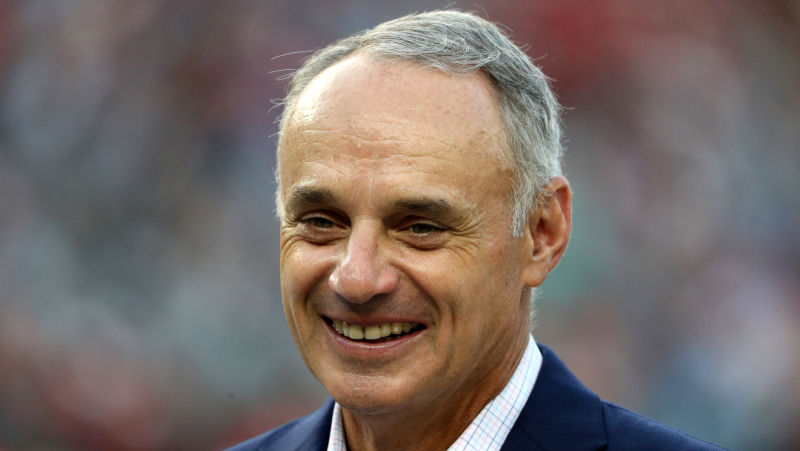Manfred is joking with assertion that every team wants to win

By DERON SNYDER (as published in The Washington Times)
Like his counterpart in the NFL, baseball commissioner Rob Manfred is tasked with taking teams’ obvious actions and pretending that something else is going on.
Whereas Roger Goodell insists that Colin Kaepernick isn’t being blackballed – despite overwhelming evidence to the contrary – Manfred contends that multiple teams aren’t tanking – despite a bevy of unsigned free agents for the second consecutive offseason.
“This narrative that our teams aren’t trying is just not supported by the facts,” Manfred told reporters Sunday during a news conference. “Our teams are trying. Every single one of them wants to win. It may look a little different to outsiders because the game has changed, [and] the way that people think about the game, the way people think about putting a winning team together, has changed. But that doesn’t mean they’re not trying.”
I don’t doubt that every single team wants to win.
It’s just far from being the No. 1 priority for most of them, especially in the short-term.
If winning occurs at some point, after a few years of low-priced players and barrel-scraping payrolls, great. If not, oh well: The bottom line will remain plumb and juicy from tens of millions in revenue-sharing dollars.
That’s the type of “winning” that most teams prefer, regardless of win-loss records.
“I reject that payroll is a measure of how much teams are trying or how successful that team is going to be,” Manfred said. “Baseball has always been a cyclical business.”
Payroll is unreliable as a predictor of success, but it’s a fair indication of effort. ESPN reports that 60 percent of baseball’s teams are $50 million below the $206 million luxury-tax threshold, and nearly half the teams are $75 million under. Eight teams are more than $100 million shy of the threshold.
Granted, a handful of those clubs could be planning to make runs with five-tool prospects at multiple positions and high-caliber young arms on the mound. But that leaves the vast majority as also-rans, content to field rosters full of questionable youngsters, veterans on the decline, and Quadruple-A players.
Manfred insults our intelligence by maintaining that teams like the Orioles, Pirates and Rays are trying as hard as, say, the Nationals, even though Washington has spent more this winter ($189 million) than the others’ combined projected payroll this year ($173 million).
Manfred turns a blind eye but Nats’ ace Max Scherzer sees a problem.
“When there’s too many teams not trying to win, that poisons the game,” Scherzer told reporters last week. “It poisons the fan experience and creates bandwagon fans … and tat’s not the type of fans you want to create. You want to create the fans that are following the team year in, year out.”
Scherzer said fans must pressure the league to demand more competitiveness. But those who look at the Houston Astros’ and Chicago Cubs’ model of success are unlikely to complain vociferously, figuring that a tank job might work in their city, too.
Manfred said the stagnant free-agent market is partially players’ fault for pronouncing that Bryce Harper could command the sport’s first $400 million contract. If the players can blame themselves for anything, it’s believing that their salaries would rise at the same pace as baseball’s revenues.
Instead, a new mindset has taken hold in front offices and owners’ suites, leaving the players stuck in a system built to control their costs over six years before compensating them as free agents at fair market prices.
“Our biggest mistake was operating under the assumption that the norms that were always in place were going to continue to be respected,” Nats closer Sean Doolittle told The New York Times last week.
There’s a relatively simple solution that should be on the union’s “must-have” list when the next labor agreement is negotiated. No longer should teams be allowed to spend as little as they desire while raking in revenue. There needs to be a mandatory payroll floor, a designated minimum that each team is required to spend on player salaries.
Attempts at competitive balance are doomed if teams only pay a penalty for overspending, but nothing prevents them from underspending.
Minimum payrolls won’t ensure the return of 10-year contracts worth more than $300 million, pacts that could disappear in a simple market correction. Considering that the majority of those contracts are bad deals at the end, teams’ hesitancy to enter them is understandable, even for young talents like Bryce Harper and Manny Machado.
However, the dearth of free-agent signings isn’t about Harper and Machado, whose age and accomplishments make them the most-likely candidates for mega-contracts. Teams can try to win without signing those players. But there are too many unsigned free agents for Manfred to convince us that “collusion” – technically or otherwise – isn’t occurring.
Whoever he thinks he’s fooling, it’s not working.
— Brooklyn-born and Howard-educated, Deron Snyder writes his award-winning column for The Washington Times on Tuesdays and Thursdays. Follow him on Twitter @DeronSnyder.
 Follow
Follow
